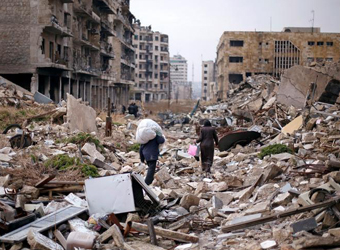France’s foreign minister said on Wednesday there was no sign of a political solution for Syria other than U.N.-led peace talks in Vienna and they were the “last hope”.
Several attempts at U.N.-sponsored peacemaking have fallen flat as Syrian government forces backed by Russia and Iran have recovered large swathes of the country from rebels since 2015.
Government forces recently escalated offensives against two remaining rebel pockets, Idlib in the northwest and eastern Ghouta near Damascus, while Turkey has poured troops into the north to fight Kurdish militias who have carved out regional autonomy and are seen by Ankara as a menace to its security.
Having regained the upper hand in the almost seven-year civil war, President Bashar al-Assad appears far from ready to negotiate with foes at all, let alone step down as part of any peaceful solution as rebel groups have demanded.
“Today, there is no political perspective that presents itself, other than – and it’s the last hope – the meeting that will be held in Vienna tomorrow under the auspices of the United Nations, where the belligerents will be present and where we hope a peace agenda will be mapped out,” French Foreign Minister Jean-Yves Le Drian told lawmakers in Paris.
Staffan de Mistura, the U.N. Special Envoy for Syria, invited the Syrian government and opposition to a two-day meeting in the Austrian capital with the goal of addressing issues related to a new constitution.
“By definition I am optimistic…It’s a very critical moment. Very, very critical,” De Mistura told reporters in Vienna, adding that both sides had promised to send full delegations.
The chief negotiator for the Syrian opposition, Nasr Hariri, said the next two days would be a real test for all sides to prove their commitment to a political solution rather than a military one.
SEPARATE RUSSIAN PEACE BID
The Vienna meeting comes a few days before Russia convenes its own Syrian peace congress in Sochi. Western and some Arab states believe Moscow aims to create a parallel political track that would undermine the United Nations and lay groundwork for a solution more suitable to the Damascus government.
Hariri said the opposition would decide over the next two days whether it will attend the Sochi meeting, telling reporters in Vienna he was still lacking information on the Russian-led initiative.
“Is Russia unable to really bring the regime to the negotiating table or does it not want to bring them to the negotiating table?” Hariri said.
“The main place to achieve a political solution, a political transition is in the UN-led process (in the Geneva framework)… It is very dangerous to enter in any parallel initiative and ignore the main political process which is here in the UN-led process.”
U.S. Secretary of State Rex Tillerson spoke with Russian counterpart Sergei Lavrov on Wednesday about Moscow’s role in ensuring “the Assad regime plays a constructive role in the U.N.-led Geneva process,” a State Department statement said.
De Mistura has presided over a sporadic series of talks in Geneva, with a mandate to discuss new elections, reformed governance, a new constitution and the fight against terrorism.
But he has not managed to coax the warring sides into speaking face-to-face, and it was only in the eighth round in December that the rebel opposition united in one delegation, raising modest hopes for direct talks.
But the Syrian government delegation objected to the opposition’s tough line on the future of Assad, and the talks achieved nothing.
The scales tipped even more Assad’s way after U.S. President Donald Trump withdrew aid to mainstream rebels in favor of focusing on the fight against Islamic State militants, whose “caliphate” in eastern Syria collapsed last year.
On Tuesday evening the British, French, Jordanian, Saudi and U.S., foreign ministers met in Paris to see how to give extra support to De Mistura and consult on how to handle Russia’s planned gathering in Sochi.
“We want to put Geneva back at the center of the game and that’s what we agreed,” said a French diplomatic source.
“What the government bombings and the worrying developments of the Turkish action in the north show … is that we are entering a danger zone. It’s our job to prevent this getting worse, be it on a military or humanitarian level.”
source: Reuters


